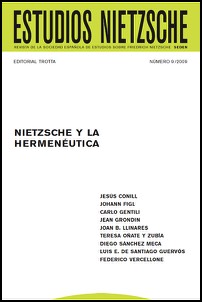Hermenéutica genealógica desde el cuerpo
DOI:
https://doi.org/10.24310/EstudiosNIETen.vi9.10297Keywords:
hermenéutica, genealogía, cuerpo, experiencia, valoresAbstract
El objetivo de esta contribución es mostrar la transformación hermenéutica de la filosofía a través de la genealogía de Nietzsche, su consideración del cuerpo, el poder, el valor y el sufrimiento; a diferencia de Heidegger y Apel, ésta es una hermenéutica genealógica de la experiencia a partir del cuerpo, que puede conectarse con el pensamiento español de Zubiri y Laín Entralgo.
Downloads
Metrics
References
Apel, K.O, La transformación de la filosofía, Madrid: Taurus, vol. II.
Figl, J., Interpretation als philosophisches Prinzip, Berlin/New York: de Gruyter, 1982; J. Conill, El poder de la mentira, Madrid: Tecnos, 1997.
Nietzsche, F., Obras Completas, I-IV (OC ). Director ed. Diego Sánchez Meca. Madrid: Tecnos, 2011-2016
Nietzsche, F., Correspondencia I-VI. (CO). Director ed. Luis E. de Santiago Guervós. Madrid : Trotta, 2005- 2012.
Nietzsche, F., Fragmentos Póstumos I-IV (FP). Director ed. Diego Sánchez Meca. Madrid: Tecnos, 2006-2010.
Plessner, H. , Stufen des Organischen und der Mensch, Berlin, 3ª ed., 1975,.
Schipperges, H., Kosmos Anthropos. Entwürfe zu einer Philosophie des Leibes, Stuttgart, 1981.
Schmitz, H., System der Philosophie, Bd. 2, Teil 1: «Der Leib», Bonn, 1965.
Downloads
Published
How to Cite
Issue
Section
License
As of issue 21 (2021) this journal is published only in open access (diamond route).
From that number 21, like the previous numbers published in NIETZSCHE STUDIES, they are subject to the Creative Commons Acknowledgment-NoComercia-ShareIgual 4.0 license, the full text of which can be consulted at <http://creativecommons.org/licenses/by-nc-sa/4.0 >
It is the responsibility of the authors to obtain the necessary permissions of the images that are subject to copyright.
This work is licensed under a Creative Commons Attribution-NonCommercial-ShareAlike 4.0 International License.
Copyright generates two different rights: moral rights and patrimonial rights that EJFB recognizes and respects. Moral rights are those relating to the recognition of the authorship. They are rights of a personal nature that are perpetual, inalienable, unseizable and imprescriptible as consequence of the indivisible union of the author and his/her work.
Patrimonial rights are those that can be derived from the reproduction, distribution, adaptation or communication of the work, among others.







11.png)
